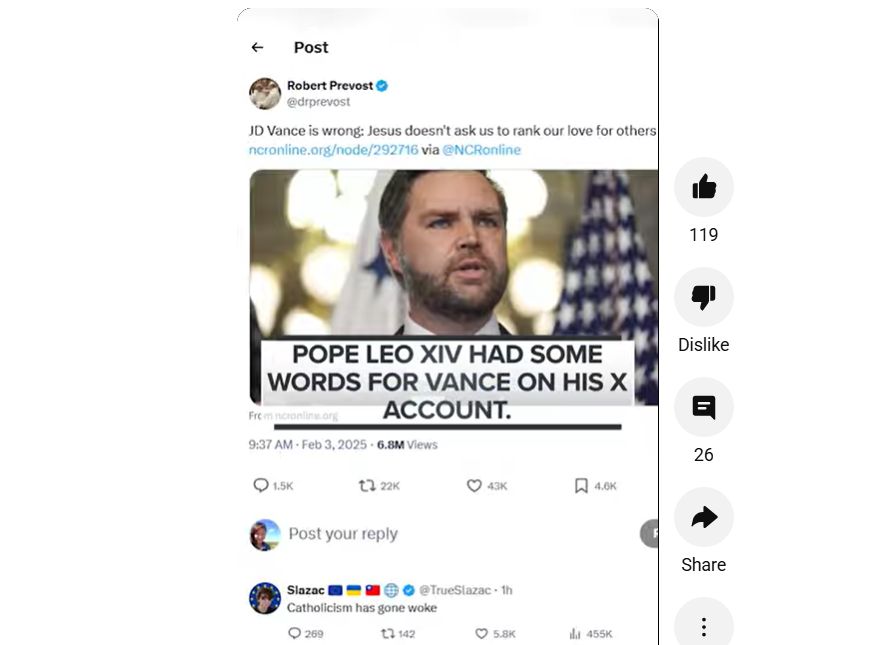We’re told this is a good thing. A modern thing. A necessary thing. “Meeting people where they are,” they say. And where are people? On X. On Instagram. On TikTok. Online. But this isn’t a celebrity we’re discussing. This isn’t a tech CEO in California. This is the Pope. The Bishop of Rome. The spiritual leader of over a billion Catholics. The Vicar of Christ.
The Pope is not a pundit. He’s not Piers Morgan. He’s not a therapist. He’s not a content creator.
And if the Pope knows what’s good for the papacy, for faith, and for the fragile souls of this disoriented age — he’ll log off. Permanently. Because when the Pope tweets, something sacred dies. We’ve been conditioned to believe that everything — every institution, every leader, every value — must adapt to “the digital age” or risk extinction. If the Church doesn’t engage on social media, it’s “out of touch.” If it doesn’t have a handle and a content strategy, it’s “irrelevant.”
But relevance isn’t holiness. And X is not the Areopagus. It’s not the sermon on the mount. It’s a dopamine farm built for distraction, outrage, and ego. The Pope doesn’t belong there. Not because he’s aloof, but because he’s supposed to be above it. Not in arrogance, but in elevation. His words are meant to carry the weight of centuries, not chase metrics by the hour.
Some will say, “But what about President Trump? He uses social media to speak directly to the people.” Sure. But the Pope isn’t Trump. He’s not supposed to be. Trump is a political animal. His job is to win. To persuade. To brawl. The internet suits him because he is the internet. A man of appetites, insults, and theater.
The Pope’s job isn’t to win. It’s to serve. To point upward. To protect the mysteries, not meme them. To offer a quiet kind of clarity, not hot takes packaged in 280 characters. When the Pope logs on, he doesn’t bring the Church to the internet. He brings the internet into the Church. And the internet devours sacred things.
The Church is in a sorry state. Mass attendance is down. Confession is all but forgotten. Vocations are in freefall. The moral authority of bishops is in tatters. We are living through a civilizational desert. People aren’t starving for tweets. They’re starving for meaning. For mystery. For something real. And mystery cannot survive virality. The Pope’s presence online doesn’t elevate the medium; it degrades the message. His every post will be politicized, atomized, mocked, and manipulated. He’ll trend one day, be ratioed the next. His words will compete with thirst traps and crypto scams. And worst of all, he’ll begin to measure impact not in souls, but in shares.
That’s not evangelization. That’s brand management. A pope on social media is too reachable. Too explainable. Too ordinary. The Church has always needed distance — holy distance. That’s why the vestments. The Latin. The incense. The long silences. These are not affectations. They’re reminders that this office is not just another voice in the chaos.
What We Need From the Pope
The Pope is not a pundit. He’s not Piers Morgan. He’s not a therapist. He’s not a content creator. He is a living symbol of continuity, of mystery, of the divine piercing history. And the divine doesn’t tweet. The modern papacy already suffers from too much exposure. The white cassock has become a PR costume. The Vatican has been overrun by messaging strategists. And now, with every tweet, the Pope risks becoming not a shepherd, but a personality. One more verified voice in the marketplace of noise. We need less noise.
We need a Pope who disappears into prayer, not into the feed. A Pope whose silence stuns, not whose tweets compete with trending hashtags. A Pope who stands still while the world scrolls past in chaos. The digital world rewards immediacy, but the Church deals in eternity. That’s the tension. And that’s why the Pope should log off — not out of snobbery, but out of fidelity to his role.
If he wants to reach hearts, let him walk among the poor. Let him be seen where no cameras roll. Let his words echo from pulpits, not platforms. Because the Pope shouldn’t be viral. He should be untouchable. And if we forget that, if we drag him into the muck of digital performance, we’ll look up one day and realize: we didn’t modernize the papacy. We turned it into content, and then we scrolled past.
READ MORE from John Mac Ghlionn:
























